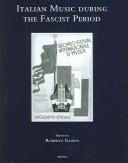| Listing 1 - 5 of 5 |
Sort by
|
Book
Year: 1956 Publisher: Bruxelles : CeBeDeM,
Abstract | Keywords | Export | Availability | Bookmark
 Loading...
Loading...Choose an application
- Reference Manager
- EndNote
- RefWorks (Direct export to RefWorks)
Book
ISBN: 1283116375 9786613116376 1580467601 1580463258 Year: 2010 Publisher: Rochester, N.Y. : University of Rochester Press,
Abstract | Keywords | Export | Availability | Bookmark
 Loading...
Loading...Choose an application
- Reference Manager
- EndNote
- RefWorks (Direct export to RefWorks)
Luigi Dallapiccola was one of twentieth century's most accomplished and admired composers. His music incorporated many of the twelve-tone techniques developed by Arnold Schoenberg, Alban Berg, and Anton von Webern, but blended their expressionistic impulses with an Italianate sense of lyricism. Brian Alegant's The Twelve-Tone Music of Luigi Dallapiccola traces the evolution of Dallapiccola's compositional technique over a thirty-year period (1942-74). Using both historical and music-analytical lenses, this book documents the influences of Webern and Schoenberg, highlights Dallapiccola's innovative handling of harmony, form, and text setting, and sheds light on several works that have been virtually ignored. Alegant's book will be a crucial source of insights for scholars and other readers interested in twentieth-century music.
Aphorism. --- Dallapiccola, Luigi, 1904-1975 -- Criticism and interpretation. --- Music. --- Dallapiccola, Luigi, --- Criticism and interpretation. --- Dallapikkola, Luidzhi, --- 20th Century Music. --- Compositional Technique. --- Expressionism. --- Form. --- Harmony. --- Italian Lyricism. --- Luigi Dallapiccola. --- Musical Innovation. --- Schoenberg. --- Text Setting. --- Twelve-Tone Music. --- Webern. --- MUSIC / History & Criticism.
Periodical
Year: 1982
Abstract | Keywords | Export | Availability | Bookmark
 Loading...
Loading...Choose an application
- Reference Manager
- EndNote
- RefWorks (Direct export to RefWorks)
Hedendaagse muziek --- Compositie --- Stijlstudies --- Mahler --- Delius, Frederick (1862-1934) --- Stravinsky, Igor --- Berg, Alban (1885-1935) --- Ravel, Maurice (1875-1937) --- Debussy, Claude (1862-1918) --- Poulenc, Francis --- Dallapiccola, Luigi (1904-1975) --- Strauss, Richard --- 20e eeuw

ISBN: 2503515177 9782503515175 Year: 2004 Volume: 10 Publisher: Turnhout: Brepols,
Abstract | Keywords | Export | Availability | Bookmark
 Loading...
Loading...Choose an application
- Reference Manager
- EndNote
- RefWorks (Direct export to RefWorks)
«My generation is guilty through and through : no justification is possible. At most there may be extenuating circumstances… Fascism — Dallapiccola claimed — had used a new weapon… a weapon much mightier than the magnetic mines: in comparison, even the atomic bomb begins to look trifling. The weapon I refer to is much more subtle and underhand. It took years to realize this and to discover its secret. The first to use it systematically and on a vast scale in the West was Benito Mussolini. This weapon is called Propaganda. With it and with the stifling of the press, its first derivative, a lie can be turned into truth.» [‘Prime composizioni corali. Postscriptum’, 29 January 1962.]
Music --- muziekgeschiedenis --- anno 1940-1949 --- anno 1930-1939 --- Italy --- Composers --- Fascism and music --- National socialism and music --- Musique --- Compositeurs --- Fascisme et musique --- Nazisme et musique --- History and criticism. --- Attitudes --- Histoire et critique --- Fascism and motion pictures --- History and criticism --- Dallapiccola, Luigi, --- Dallapiccola, Luigi --- 20th century --- Politics and government --- 1922-1945 --- Music and state --- Music - Italy - 20th century - History and criticism --- Fascism and motion pictures - Italy. --- Composers - Italy --- Dallapiccola, Luigi, - 1904-1975 --- Italiaans --- Fascisme --- Italië --- 20e eeuw
Book

Year: 1973
Abstract | Keywords | Export | Availability | Bookmark
 Loading...
Loading...Choose an application
- Reference Manager
- EndNote
- RefWorks (Direct export to RefWorks)
Muziekgeschiedenis --- Biografieën --- Stijlstudies --- Thematische catalogi --- Bártok, Béla (1881-1945) --- Berg, Alban (1885-1935) --- Berio, Luciano (1925-2003) --- Boulez, Pierre (1925-2016) --- Britten, Benjamin (1913-1976) --- Brown, Earle --- Cage, John (1912-1992) --- Carter --- Shostakovich, Dmitry (1906-1975) --- Dallapiccola, Luigi (1904-1975) --- Debussy, Claude (1862-1918) --- Dutilleux, Henri --- Falla, Manuel de --- Feldman, Morton --- Hindemith, Paul --- Ives, Charles --- Janácek, Leos --- Jolivet, André (1905-1974) --- Kagel, Mauricio --- Krenek, Ernst --- Kurtág, György --- Ligeti, György (1923-2006) --- Lutoslawski, Witold --- Mahler --- Messiaen, Olivier (1908-1992) --- Milhaud, Darius --- Nielsen --- Nono, Luigi --- Penderecki, Krzysztof (1933-2020) --- Poulenc, Francis --- Pousseur, Henri (1929-2009) --- Ravel, Maurice (1875-1937) --- Reger, Max (1873-1916) --- Roussel, Albert --- Satie, Erik (1866-1925) --- Schnebel, Dieter --- Schoenberg, Arnold (1874-1951) --- Skrjabin, Aleksandr --- Sibelius, Jean --- Stravinsky, Igor --- Varèse, Edgard (1883-1965) --- Vaughan Williams, Ralph --- Villa-Lobos, Heitor (1887-1959) --- Strauss, Richard --- 20e eeuw --- Rachmaninoff, Serge (1873-1943)
| Listing 1 - 5 of 5 |
Sort by
|

 Search
Search Feedback
Feedback About UniCat
About UniCat  Help
Help News
News